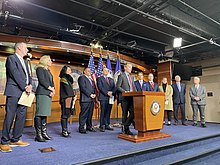From Wikipedia, the free encyclopedia
https://en.wikipedia.org/wiki/Problem_Solvers_Caucus
Problem Solvers Caucus | |
|---|---|
 | |
| Co-Chairs | Josh Gottheimer (D) Brian Fitzpatrick (R) |
| Founded | January 23, 2017 |
| Ideology | Centrism Bipartisanship Big tent |
| Political position | Center |
| Colors | Red and Blue |
| Seats in House Democratic Caucus | 29 / 222 |
| Seats in House Republican Caucus | 29 / 211 |
| Seats in the House | 58 / 435
|
| Website | |
| problemsolverscaucus | |
The Problem Solvers Caucus is a bipartisan group in the United States House of Representatives that includes members equally divided between Democrats and Republicans, who seek to foster bipartisan cooperation on key policy issues. The group was created in January 2017 as an outgrowth of meetings held by political organization No Labels starting in 2014. It is currently co-chaired by Josh Gottheimer (D-NJ) and Brian Fitzpatrick (R-PA).
History
The Problem Solvers Caucus developed over time as an outgrowth of informal meetings organized by the political reform group No Labels. No Labels spent years on Capitol Hill working to get members in a room to talk with colleagues from the other party. These informal "get to know you" meetings led to more substantive cooperation across the aisle, including the introduction of nine bipartisan bills to reduce government waste and inefficiency, and the passage of the No Budget, No Pay Act of 2013 and the Medicare "doc fix" in 2015.
Over time, No Labels continued to organize members into a more cohesive group and eventually branded the group the "Problem Solvers" and recruited its first two co-chairs, Rep. Reid Ribble (R-WI) and Rep. Kurt Schrader (D-OR). This group of members organized by No Labels also signed a resolution (H.R. 207) calling for both parties to unify behind a National Strategic Agenda with four goals focused on: job creation, balancing the budget, securing Medicare and Social Security, and energy security.
The early iteration of the Problem Solvers group was promising, but it lacked the cohesion of groups on the left and right like the Progressive Caucus and Freedom Caucus. That began to change at the outset of 115th Congress when the Problem Solvers registered as an independent member-driven Caucus.
Writing in The New York Times about the Problem Solvers Caucus, then co-chairs Reed and Gottheimer said: "We all knew the partisanship in Washington had gotten out of control and felt the need to create a bipartisan group committed to getting to "yes" on important issues. We have agreed to vote together for any policy proposal that garners the support of 75 percent of the entire Problem Solvers Caucus, as well as 51 percent of both the Democrats and Republicans in the caucus."
Today, the Problem Solvers Caucus is co-chaired by Rep. Josh Gottheimer (D-NJ) and Rep. Brian Fitzpatrick (R-PA), and counts 58 members evenly divided between the parties, who are working to forge bipartisan solutions to America's toughest challenges.
Healthcare reform
During the week of August 4, 2017, the 43-member House Problem Solvers Caucus released a compromise to shore up the struggling insurance exchanges. The proposal focused on the skyrocketing cost of individual health insurance premiums. At the time, the Trump administration considered suspending cost-sharing payments that defray out-of-pocket payments like deductibles and co-payments, a move which insurers said could cause premiums to rise by 15 percent or more.
The second part of the Problem Solvers plan would have provided relief to help states deal with the high cost of pre-existing and chronic conditions. The relief is provided through a dedicated stability fund that states could use to reduce premiums and limit losses for providing coverage for these high-cost patients. The third part of the plan provides relief to certain businesses from the mandate that they provide insurance to full-time employees. It also defines "full time" as a 40-hour workweek to discourage businesses from manipulating employees' weekly hours to skirt the mandate.
The plan would have also eliminated the Medical Device Tax, an excise charge of 2.3 percent, which opponents claim is passed onto consumers and reduces funds for research and development.
Congressional rules reform
After the 2018 Midterm elections, the Problem Solvers Caucus and House Democratic Leadership negotiated a package that reformed the rules of the House. The initiative, entitled "Break the Gridlock", gives bipartisan ideas a fair hearing on the House floor and encourages legislation through compromise.
COVID-19 relief
In September 2020, the Problem Solvers released their "March to Common Ground" COVID-19 relief package, an outline for a Congressional bi-partisan compromise that showed that members of both parties were willing to listen to each other in order to craft legislation.
Capitol riot and reaction
On May 18, 2021, the Problem Solvers Caucus endorsed bipartisan legislation to investigate the attack on the Capitol. However, the next day only 18 of 28 Republican Problem Solvers voted in support of creating a bipartisan commission to lead the investigation.
List of co-chairs
| Term Start | Term End | Democratic Co-chair | Republican Co-chair |
|---|---|---|---|
| 2017 | 2019 | Josh Gottheimer (D-NJ) | Tom Reed (R-NY) |
| 2019 | 2021 | ||
| 2021 | present | Brian Fitzpatrick (R-PA) |
Membership
This group include 58 members: 29 Democrats and 29 Republicans.


